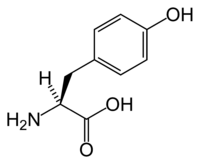Tyrosinemia Type 3

Tyrosinemia type 3 is an inborn error of tyrosine metabolism characterised by mild hypertyrosinemia and increased urinary excretion of 4-hydroxyphenylpyruvate, 4-hydroxyphenyllactate and 4-hydroxyphenylacetate.
Epidemiology
It is the least frequent form of tyrosinemia (see this term) with less than 20 cases reported in the literature so far.
Clinical description
The clinical picture is highly variable ranging from asymptomatic in patients identified through neonatal screening program studies to patients with neurologic manifestations including intellectual deficit and ataxia.
Etiology
Tyrosinemia type 3 is caused by mutations in the HPD gene (12q14-qter) encoding 4-hydroxyphenylpyruvate dioxygenase.
Genetic counseling
Tyrosinemia type 3 is transmitted as an autosomal recessive trait
Management and treatment
Despite the variable clinical picture, patients with tyrosinemia type 3 are recommended to follow a phenylalanine- and tyrosine-restricted diet.